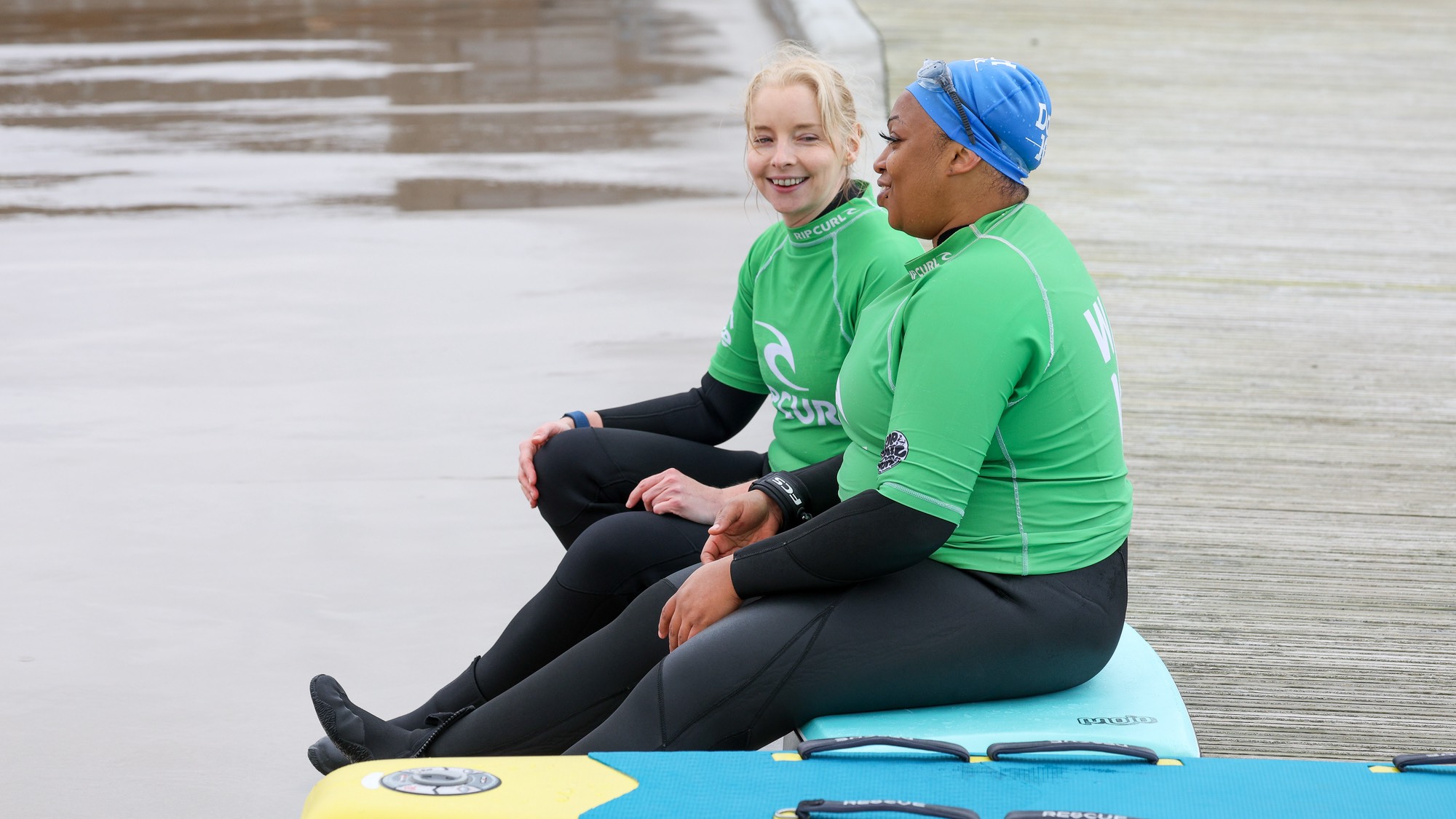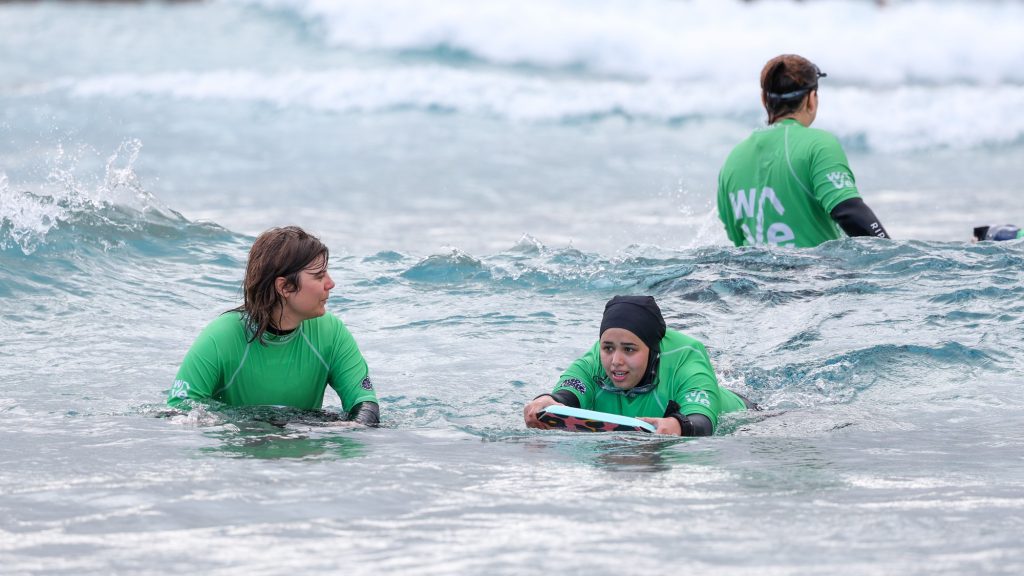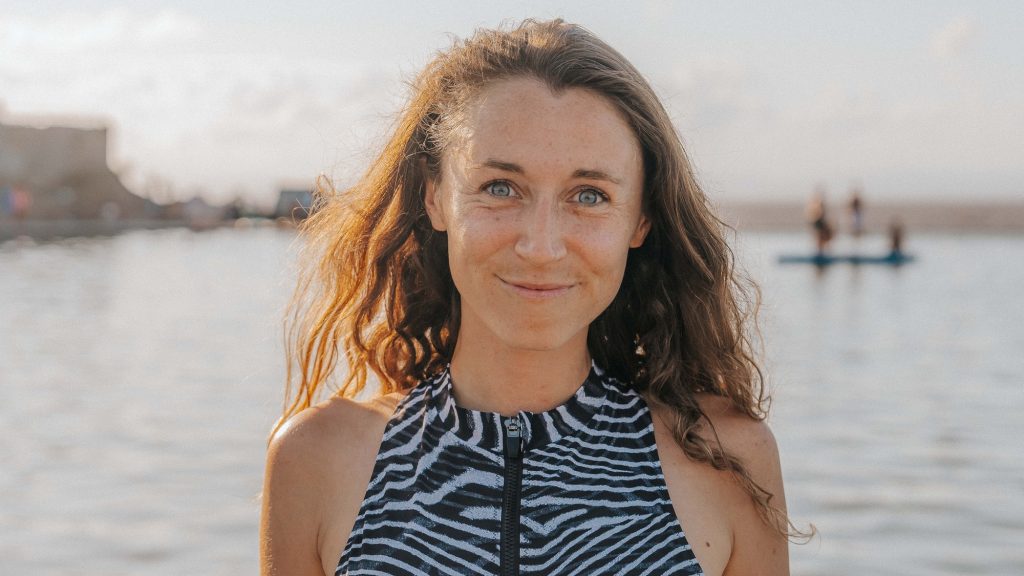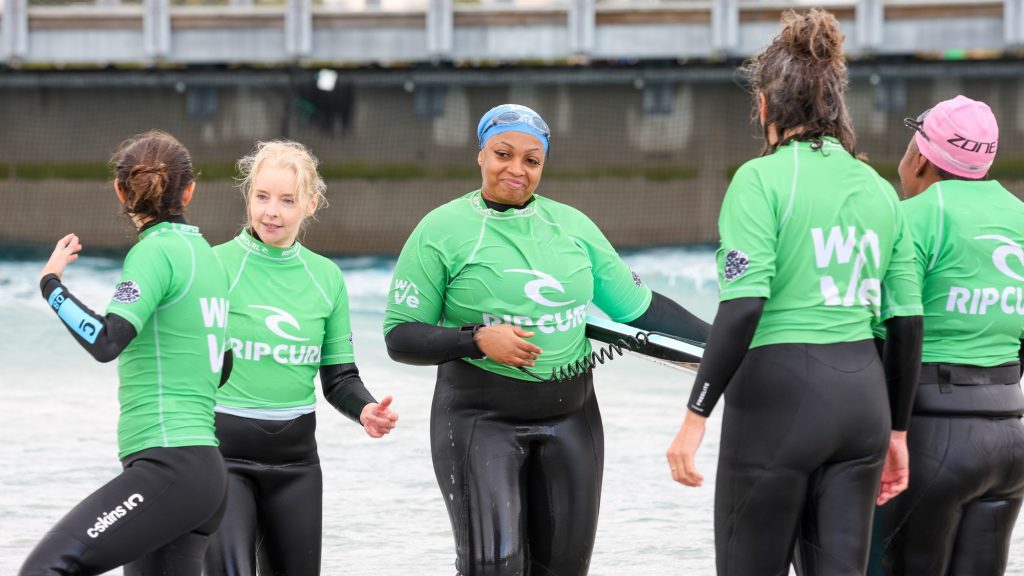Treating migrant and asylum seeker trauma at a wave pool

So far this year, more than 31,000 people have crossed the English Channel in attempts to seek political asylum in the U.K. Of those, 52 have died – the most since the International Office of Migration started tracking the numbers in 2018. For at least some of the refugees who migrate to England, the water isn’t a place of joy or freedom, but of peril.
It’s amid those rising numbers and an increasingly politicized narrative around U.K. immigration that a Plymouth group founded the nonprofit Reclaim the Sea in 2022. That summer, the organization worked with another local nonprofit, Refugees Welcome North Somerset (RWNS), to run a pilot program with eight women who had been displaced or resettled. The women who participated were, according to RWNS, particularly isolated or struggling with the impact of their migration.
Over those first eight weeks, each session focused on skills like floating, swimming, stand-up paddle boarding and surfing at Bristol’s The Wave. It was clear, however, that the participants were gaining more than water skills.
“The positive impact was noticeable as soon as the first session started,” said Donna King, CEO of RWNS. “From the excitement of receiving their very own swimsuit, to meeting volunteers and repeating the affirmations as a group – this all combined to lift the ladies and build their confidence. This has been about building lasting love, trust and community.”
Not long after, Rebecca Wetten, who’s head of development at the environmental nonprofit Hubbub, saw a short film about the program and its impact. In addition to her development work, she’s a trained swim instructor and an open-water swimmer, and was inspired to launch a chapter closer to home in Bristol.
“For some, [the sea] is a place of joy and safety,” she said. “And for others, it’s not a welcoming space at all. That film made me realize what a space of trauma the sea can be.”

Part of what struck Wetten is also the degree to which refugees and asylum seekers struggle with mental health. In the U.K., she said, 61% of them suffer from severe mental illness, while refugees and asylum seekers are five times more likely to have mental health needs than the average population.
“I can’t underscore enough how tough life is as a refugee or asylum seeker. Here in the U.K., it’s a hostile environment, and many live with multiple layers of trauma.”
It’s for that reason that trauma-informed training was a cornerstone of Reclaim the Sea’s pre-program prep for volunteers. First, said Wetten, every volunteer was trained to handle things like picking up on signs of distress or anxiety; in which scenarios to use touch; where on the body it’s acceptable to touch – and where it isn’t. Volunteers also received training about power dynamics, and how they come into play in a program like theirs.
“When you organize an initiative like this, it’s important that you train the team to understand that we do this because we know that we can have impact, but we don’t expect gratitude or anything in return from our participants,” she said. At the same time, volunteers also learned techniques to set boundaries and take time out if they needed for their own emotional health.

Once the Bristol volunteers were up to speed, the program kicked off and ran for four weeks in September and October. Eight women participated, and at each session they were greeted with pastries and coffee, plus all the equipment they might need to swim – including culturally sensitive garments – and a changing tent. Each time, the group began with mediation and a set of affirmations to set the tone, before pairing off and getting into the water. Each session concluded with group lunch at a local café.
While the physical skills were the ostensible focus of Reclaim the Sea’s program, social and emotional wellness were byproducts. The sessions focused on the present moment and mindfulness; healing trauma can include reconnecting with the body. For at least some of the women who participated, the sessions were rare chances to take care of and reconnect with themselves.
“Something I noticed about these women was that very often, they have not done a single thing just for themselves and their own joy for a really, really long time,” said Wetten.
“Some of these women unexpectedly found themselves [in the U.K.] alone, which comes with its own challenges. For those who have family or children, it’s all about making sure that they can provide basic needs to their families. There was something amazing about being able to just play.”
After three sessions at the marine tidal pools, the Bristol program culminated, in week four, at The Wave. It was there, said Wetten, that a new level of joy emerged. The women were in a gentle bay area at the surf park, where they could glide on body boards and try their swim skills in a new environment.

For Wetten, the space was ideal in multiple ways.
Being at The Wave, she said, “brought out joy and playfulness in a way that I hadn’t really seen in the previous sessions. It was like we went back to being kids; it was so freeing and so fun.”
Plus, there was the vibe.
“The lifeguard was amazing. She was there all the time and getting to know the ladies. The staff were ready to help at every opportunity. We sat in the cafe afterwards, which has these big windows that look out onto the waves – it was really well set up for what we were wanting to do. That progression of introducing people to waves in that fourth session felt perfect.”
It wasn’t just Wetten and her fellow organizers who felt the power of the program and its final session. Rido, one of the participants in both the Somerset and the Bristol programs, felt it too.
After the Bristol program ended for the season, Rido shared what changed for her. “I feel extraordinary,” she said. “These people are not like my family. They are my family. I can’t believe that me, a woman my size, can actually float in the water. I feel incredible… [it] makes all my worries go away.”
Related Coverage
